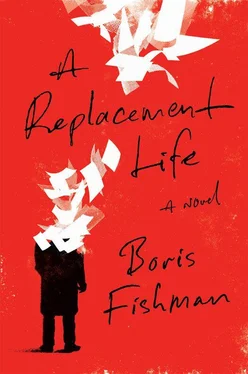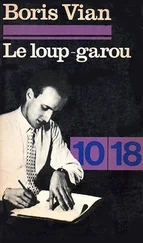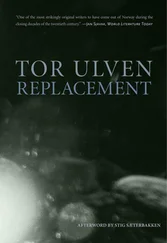The Germans sounded as if they were a hundred meters away. Two of our scouts burst into the clearing where we had made camp, gesturing wildly in the familiar code. Someone pulled the levers out of the contraption that maintained the campfire over a gravelike vault. Several boys got their bodies behind a mound of earth and pushed it into the fire like horses leading the plow. Women were frantically tearing down the wash. In minutes, our entire crew was underground, the zemlyanka s innocent under beds of birch leaves. The Germans, following the cows, passed wide of the clearing. That legend about cows knowing their way home is a bluff. Eventually, there was gunfire and objections from the animals. The blood was jumping out of my heart. Tsadik was crouched against me, his soaked pants cold against my arm. From a nearby tent, I heard the sound of muffled retching.
No one emerged until well after nightfall. Streamlets of smoke hissed through the earth where the fire had been. They had never come this close. Some said it was the scouts who needed reproach, not the cowherd, but most, having lay feet from death for hours, did not much feel like administering it to anyone but the Fritzes. Even Zelkin stood off to the side, smoking queasily. And in this way I was spared. Some irony, saved by the Germans from being killed by your own.
The letter, this new life, had taken all of forty-five minutes. What the Nazis took away, Slava restored. He carried numbers on a pad of paper: Doing this for every person they killed would take 513 years without stopping. Reading over the letter, he felt satisfaction mixed with unease. On the page, it was Grandmother but also not-Grandmother. He couldn’t say why, despite rereading the letter several times. Finally, he gave up, double-checked that it included no references to the applicant’s gender, and entered his grandfather’s name at the top.
He dozed off only when the familiar dark blue started coming into the sky. His head teemed with strange pictures and sounds: a man washing himself from a well, his coarse shirt and suspenders hung over his legs; a gray military truck rumbling over a rutted country road; the high ping of a shot in the woods. And Grandmother. Grandmother wading through a swamp, Grandmother suffocating a child, Grandmother pouring her guts out onto the grass from too many potato peels.
The bed was empty when he awoke. A note was taped to the bathroom mirror. “Did we? We should. XOXO.”
FRIDAY, JULY 21, 2006
Friday morning at Century : Sixteen pairs of feet impatiently tapped the radiant concrete behind the Junior Staff railing in anticipation of the weekend. In his office, Mr. Grayson fidgeted with the classical dial in advance of the weekend’s matinees. The writers kept sneaking out of their offices when Beau wasn’t looking, the doors schussing open and shut.
Riddle you this: Slava hadn’t slept in his bed since sharing it with Arianna, but he had slept with nobody else. They had been together every night since Kabul. She lived across the park, on the Upper West Side, a quick trip by bus. He could return home in under thirty minutes, he reassured himself whenever he thought about how far he had strayed from routine. On Tuesday night, she had stood by his desk until he paid attention. “It’s six, time to go,” she’d said. “Veg?” he’d said. She laughed.
They meant to take the train, but they walked the fifty blocks. The city was full of neighborhoods Slava knew nothing about, and again Arianna ticked off landmarks as they walked. Her first apartment in New York, where she had sat on the windowsill chain-smoking and listening to Madonna, was here. Her first kiss was on this corner. This was the deli where she had run into Philip Roth. He had asked if she was all right, and she couldn’t say anything.
From the high windows of her apartment, you could see the nervy sheet of the river. It was like the river a block from Slava’s windows, only browner. “Now what?” he had said, standing uncertainly in the middle of her suddenly vast living room, her cat dashing between their feet. She brought her shoulders into his hands, then stepped out of her skirt. Her thong peeled off like the skin of a fruit, the salty perfume of her hitting his nose, her thighs wet on top of him when they fell into bed. Afterward, they ate leftovers in bed, her cat trying to get at the chicken in her salad. “Don’t sleep so far away tonight,” she said before shutting the light. It wasn’t even nine.
At Grandfather’s, the senior Gelmans had read the false testimony the following morning, Slava’s mother dipping into the dictionary to translate the difficult words. When they were finished, they called Slava and burst into tears to show their appreciation. Then the waterworks quit and they got off to find a notary public. “You wrote it — because it happened to you, you have to start thinking that way — and you had your grandson translate it,” Slava said to Grandfather before hanging up. “Got it?” Got it, he said.
Slava peered dolefully at the wall clock. Eleven-thirty A.M. He owed three submissions to “The Hoot” by the end of the day. After a slow-moving morning, Slava had panned only a single nugget of loot, from the editorial board of the New Orleans Times-Picayune :
With its cessation of the indigent loophole, the state legislature has stripped the health care law for pants.
This was Double Trouble: a cliché on top of a flub. He closed his eyes, breathed in and out, counted to three… and there it was: “The law for cardigans, however, remains fully intact.” It was easy once you’d done one or two.
Slava was not asked to come up with the rejoinder. Paul Shank did that. Once upon a time, Slava had gently flouted this unwritten rule, thinking he would send something brilliant to Paul Shank, impress him, and make his life easier, whereupon Paul Shank would sit up and think: This mother is good ; let him write something longer. But when Paul Shank failed to respond in this way — he did, once, run what Slava had proposed, though without discussing it with the brilliant young man on Junior Staff, leaving Slava to feel like he had been slept with but not called the next day — Slava decided to mount a modest rebellion and quit forwarding rejoinders to Paul Shank altogether. This, too, passed without remark by his superior.
So Slava wrote the rejoinders “for the drawer,” as they used to say about the great suppressed writers during the Soviet period. He was Mandelstam, Pasternak, and Bulgakov. He chortled at himself in disgusted amusement. Then noted that he had been communicating with himself at a more frequent rate.
Blearily, he looked back at the papers. A Texas town had renamed itself after a cable network in exchange for free DISH service ( The Paris News , Northeast Texas). A Vermont man had invented skis for wheelchairs ( Rutland Herald ). But no flubs. The clock ticked. He had the naughty idea to invent a flub. Would the Rutland Herald call to complain? Not if he invented the paper as well. He chortled again. For two years, he had spent his weekdays combing through news from Fayetteville, Champaign, Westerly. At first he resented these provincial towns and the news they produced — after a year of strident debate, the Westerly Yacht Club had decided to build dinghy docks — skimming sonorously until he alighted on the haystack needle that would bring him one “Hoot” entry closer to the freedom to work on his own things. At some point, however, he had begun to regard their prominent personages, and the men and women who reported on them, as confederates of a kind. Lubbock, it’s you again. He knew many of its streets, if only by name. He wondered what it looked like in real life. He had never been west of New Jersey.
Читать дальше











